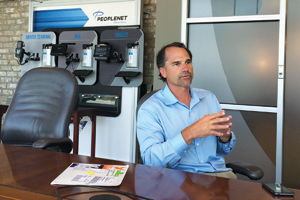Konezny Turns to Global Growth as Trimble Makes Domestic Gains

This story appears in the July 28 print edition of Transport Topics.
MINNETONKA, Minn. — Two decades after launching PeopleNet Communications Corp. and three years removed from its purchase by Trimble Navigation, Ron Konezny said he is in the midst of his latest mission.
“I am learning how transportation works in different parts of the world,” said Konezny, who is Trimble’s vice president of transportation and logistics.
During an hourlong interview with Transport Topics at PeopleNet’s headquarters here on July 16, he discussed the changing trucking technology landscape in the domestic market and the multiple opportunities he sees abroad.
Trimble has dramatically expanded its presence in the North American transportation market in recent years through its acquisitions of PeopleNet, TMW Systems, ALK Technologies and others.
Konezny said many fleets have lean information technology staffs and have been buying new devices and software in a piecemeal fashion.
These fleets now “have so much data, but really have so little information,” he said. For example, “they know trouble routes, but not why it is a trouble route.” But by integrating multiple systems at higher processing speeds than ever before possible, “we can transform customers’ businesses.”
Onboard truck telematics services, combined with more drivers using their own smart phones or other devices, mean the industry is about to enter “the next wave —connecting these systems so they can talk,” Konezny said.
That was a common message shared by executives during TT’s behind-the-scenes look at PeopleNet’s operations and preview of a new communications platform (see related story).
Konezny said Trimble remains interested in additional acquisitions, and it will keep on working with outside companies on integrations.
Trimble remains cautious on branding, he said, as fleets have brand loyalty. However, the individual companies will begin to reference Trimble within their logos, and larger branding changes could roll out in the future.
He said while the merging of PeopleNet into the Trimble family mostly has been smooth, it can be difficult that “we are no longer individual players” but heads of units focused on the success of a larger team.
He said Trimble being a publicly traded company means that he has to be more cautious in speaking with customers about long-term plans.
“Trimble is concerned that could be construed as a promise,” he said. “This is against my DNA as an executive before Trimble.”
Konezny devoted a significant portion of the interview to addressing international opportunities.
Brazil was one market in particular cited by Konezny as showing great promise. Australia, New Zealand, India and Eastern Europe were among other areas where he expects Trimble to make inroads in the coming years. He said products in development, such as PeopleNet’s new gateway communications platform for North America, will be the first from Trimble that “we want to be able to take worldwide.”
He also said like the diverse needs of the U.S. trucking industry, many international markets pose unique challenges.
In Europe, for example, it is not uncommon for a French logistics provider to use a Polish company for the transportation. That creates communication problems, since many European-based transportation-management systems are tailored only for the home market.
While Brazil and Australia are examples where larger enterprise solutions are viable, India has far more specialized needs.
In that highly fragmented market, fleets and shippers are generally not turning to Trimble for driver productivity or efficiency.
Instead, visibility, tracking and security are the top concerns.
One of Trimble’s largest customers in India is automobile manufacturer Maruti Suzuki. It requires the more than 500 individual fleets it relies on to ship new vehicles to use Trimble’s technology.
The result, Konezny said, has been a drop in theft of these new vehicles to nearly zero.
In India, like most foreign markets, Trimble has entered through acquisitions and relies on local business leadership, while leveraging its existing technologies.
When asked to project further into the future, Konezny suggested today’s technological breakthroughs could set the stage for driverless trucks — ones controlled by a programmer behind a desk.
“Computers will be better drivers than people in most cases,” he said.
He was quick to point out there remain other legal, cultural and privacy concerns that need to be addressed.
However, Konezny noted the traditional slow-changing nature of the trucking industry, even for far less sophisticated technology than futuristic vehicles.
“Any technology must be demonstrated before truckers will adopt,” he said. Even though investing in technology offers a strong return on investment, they want “someone else to be the guinea pig. This is an incremental journey.”
Trimble, based in Sunnyvale, California, posted net income of $218.9 million on revenue of $2.29 billion in its 2013 fiscal year ended Jan. 3.
The company’s Mobile Solutions segment, which includes PeopleNet, TMW and ALK, generated $465.1 million in revenue last year.




